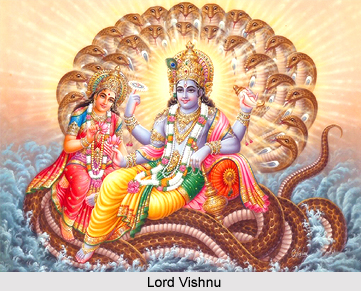 Lord Vishnu is considered the most influential deities of the Hindu trinity of gods, Lord Brahma, Lord Vishnu, Lord Shiva i.e. the Creator, the Preserver and the Destroyer. A combination of the three-god concept, Vasudeva-Krishna, the man-god; the vedic sun-god, Surya; and the Cosmic god Narayana, Lord Vishnu represents Sattva. Several legends are closely associated with this all pervading Lord.
Lord Vishnu is considered the most influential deities of the Hindu trinity of gods, Lord Brahma, Lord Vishnu, Lord Shiva i.e. the Creator, the Preserver and the Destroyer. A combination of the three-god concept, Vasudeva-Krishna, the man-god; the vedic sun-god, Surya; and the Cosmic god Narayana, Lord Vishnu represents Sattva. Several legends are closely associated with this all pervading Lord.
According to one legendary fable once after conquering the demons, the vanquisher, Lord Indra gained supremacy of the three worlds. Sage Shukra, the priest of the asuras paid a visit to them. The asuras entreated him not to depart from them and Shukra promised them with his support. When the asuras were attacked again by the gods they approached Shukra for help. Shukra advised them to wait for a favourable time and pledged to visit Lord Shiva to enquire for means of victory over the gods. The Asuras also promised Shukra to desist from hostilities towards the gods and thus, peace reigned for a while.
Shukra, as promised to the asuras, visited Mahadeva and asked him for strength more powerful than that possessed by Brihaspati, the priest of the gods. Lord Shiva recommended him to execute a painful rite of imbibing smoke with his head downwards for a period of thousand years. Shukra readily agreed to the proposal and induced himself for the severe practice.
The asuras, however in the absence of sage Shukra, were defenceless. In the wake of the situation, the devtas waged war on the asuras. The later petrified, frail and powerless took shelter under the abode of the mother of sage Shukra. The devatas chased the asuras, but the mother of Shukra rendered Lord Indra helpless with her magical powers at which the devatas fled from there. Lord Vishnu, in order to safeguard Indra advised him to enter into him that provoked the mother of Shukra. Frenzy and irritated, she threatened to burn the devatas with her powers. Lord Indra terrified at her fury requested Vishnu to slay her before she could carry out her threat. Lord Vishnu, as instigated by Indra, cut off her head much against his wish to harm a woman.
When Shukra returned after thousand years and heard about the course of events, became exasperated and cursed Vishnu to be born seven times in the world of men. Therefore, Lord Vishnu incarnated in seven different forms on this mortal earth.









